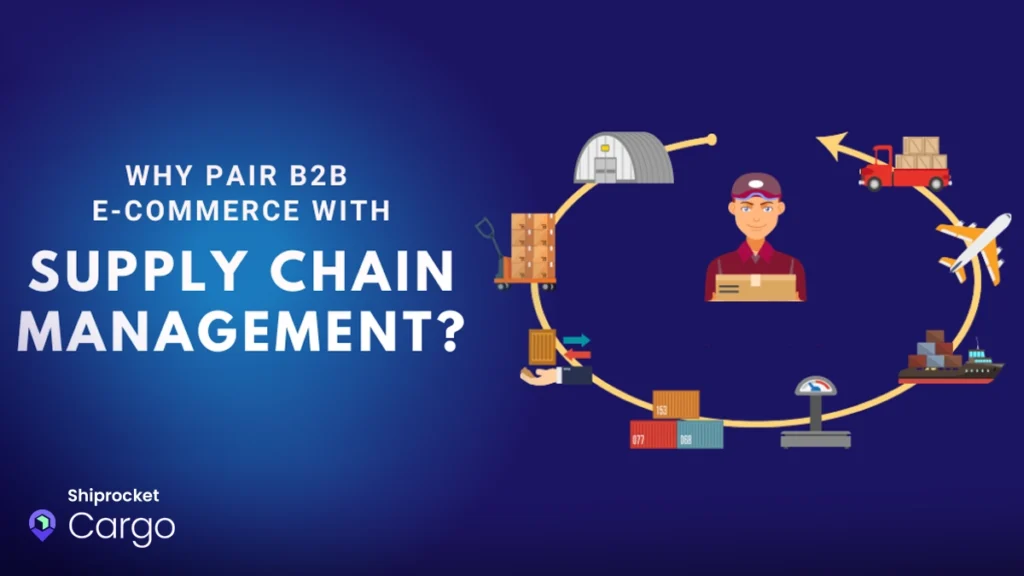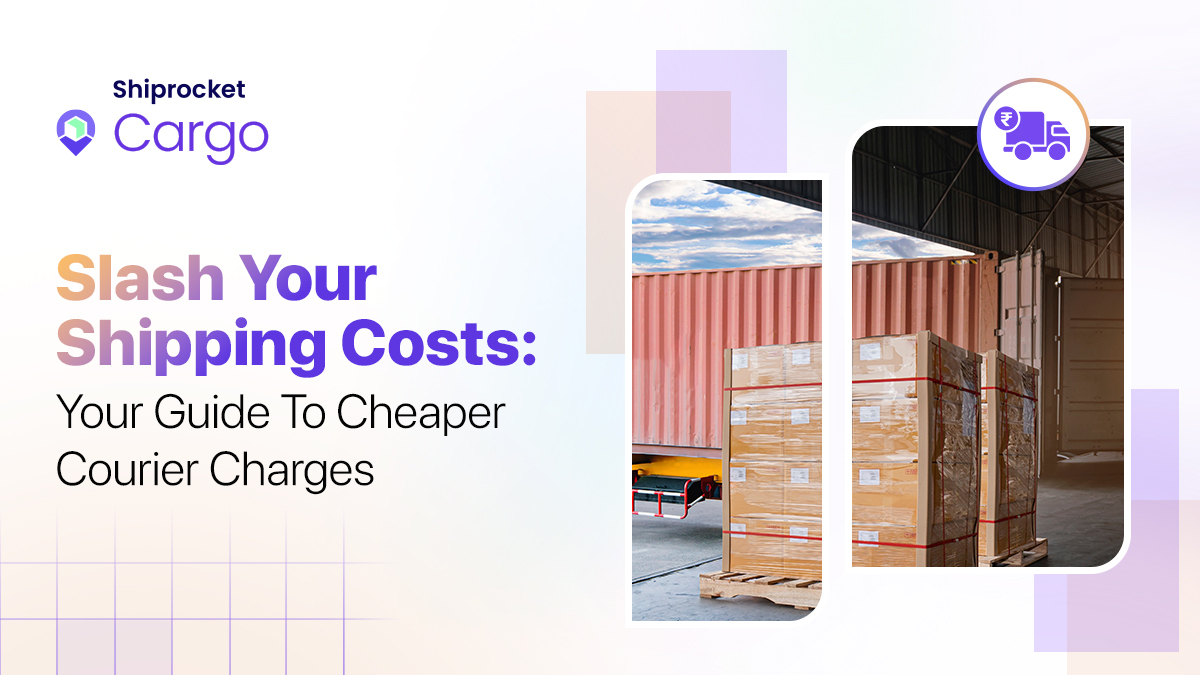B2B E-commerce Supply Chain Management
- What Is B2B Supply Chain Management?
- The Role of B2B eCommerce in Supply Chain Management
- How Can Ecommerce Help Streamline Supply Chain Management?
- 5 Challenges Of B2B Supply Chain Management In Ecommerce
- B2B Supply Chain Management Solutions
- How Shiprocket Cargo Helps In Supply Chain Management?
- Conclusion
- Frequently Asked Questions

B2B e-commerce refers to the online sale of products or services from one business to another. Supply chain management refers to managing the flow of goods and services, including the procurement of raw materials, production and distribution of finished products, and delivery to customers.
In a B2B e-commerce context, supply chain management involves coordinating the various parties involved in the production and distribution process, including suppliers, manufacturers, warehouses, distribution centers, and transportation companies. It also consists managing inventory levels, forecasting demand, and ensuring that products are delivered to customers promptly and efficiently.
Effective supply chain management is crucial for the success of a B2B e-commerce business, as it can help to reduce costs, improve efficiency, and increase customer satisfaction. Several tools and technologies are available to help companies manage their supply chains, including enterprise resource planning (ERP) systems, logistics management software, and supply chain management platforms.
Sign Up with Shiprocket Cargo for all your b2b supply chain management issues!
What Is B2B Supply Chain Management?
Business-to-business (B2B) supply chain management refers to the management of the flow of goods, information, and financial resources between businesses in the production and distribution of goods and services. This includes planning, coordinating, and controlling all activities involved in procuring, distributing, and delivering goods and services to customers.
In B2B supply chain management, businesses work together to optimize their operations and create efficiencies in the production and distribution process. This can involve coordinating the movement of raw materials, components, and finished goods between different stages of the production process, as well as managing the flow of information and communication between businesses.
Effective B2B supply chain management can help businesses reduce costs, increase efficiency, and improve customer satisfaction by ensuring that goods and services are delivered on time and in the required quantity and quality. It can also help businesses manage risk and improve their ability to respond to demand changes or supply chain disruptions.
Related: Top Common Challenges in Indian B2B Logistics Industry and Their Solutions
The Role of B2B eCommerce in Supply Chain Management
B2B eCommerce refers to the buying and selling of goods and services between businesses through an online platform. In supply chain management, B2B eCommerce can play several important roles.
Streamlining the Ordering Process
B2B eCommerce platforms can make it easier for businesses to place orders with their suppliers by providing a central location for product information and allowing for online ordering and payment. This can help reduce the time and effort required for the ordering process, improving efficiency and reducing costs.
Enhancing Communication and Collaboration
B2B eCommerce platforms can provide a way for businesses to share information and collaborate with their supply chain partners. For example, buyers and sellers can use the platform to exchange data about orders, shipments, and inventory levels. This can help improve coordination and reduce the risk of errors or delays.
Improving Visibility and Traceability
B2B eCommerce platforms can provide a single source of truth for supply chain information, which can help improve visibility and traceability throughout the supply chain. For example, businesses can use the platform to track the status of orders and shipments, monitor inventory levels, and identify potential bottlenecks or issues.
Related: What is the Impact of B2B Logistics on the Indian eCommerce Market?
Enabling Digital Transformation
B2B eCommerce platforms can be a key component of a digital transformation strategy, allowing businesses to automate and digitize their supply chain processes and take advantage of new technologies such as artificial intelligence and the Internet of Things.
Overall, B2B eCommerce can help businesses improve the efficiency, effectiveness, and transparency of their supply chain operations, which can lead to a range of benefits, such as reduced costs, improved customer satisfaction, and increased competitiveness.
How Can Ecommerce Help Streamline Supply Chain Management?
Ecommerce can greatly streamline supply chain management in several ways. First, it allows for real-time tracking of inventory levels, which can help reduce the risk of stock-outs or overstocking. By using an ecommerce platform, businesses can easily track and update their inventory levels, ensuring that they have the right amount of products on hand at all times.
Second, ecommerce can facilitate better communication and collaboration within the supply chain. By using an online platform, businesses can easily share information and updates with their partners and suppliers, improving the overall efficiency of the supply chain.
Third, ecommerce can reduce the need for physical storage space, as products can be stored and shipped directly from the manufacturer or supplier. This can reduce costs and improve the overall efficiency of the supply chain.
Finally, ecommerce can help businesses track and manage their orders and shipments, ensuring that products are delivered on time and to the right location. This can help to reduce delays and improve customer satisfaction. Overall, the use of ecommerce can greatly streamline supply chain management, helping businesses to save time, reduce costs, and improve efficiency.
To know more about B2B bulk shipments, connect with us.
5 Challenges Of B2B Supply Chain Management In Ecommerce
There are several challenges that businesses may face when managing B2B supply chains in the ecommerce industry:
- Integration
Integrating different systems and processes can be a challenge for businesses that operate in the ecommerce industry. This includes integrating the systems of different businesses in the supply chain and the various channels through which ecommerce transactions take place (e.g., online marketplaces, social media, etc.).
- Data Management
The volume of data generated in the ecommerce industry can be overwhelming, and managing this data can be a challenge for businesses. This includes data related to customer behavior, sales trends, and supply chain operations.
- Order Fulfillment
Ensuring timely and accurate order fulfillment can be a challenge in the ecommerce industry, particularly for businesses that operate on a global scale. This includes managing inventory levels, coordinating with shipping and transportation partners, and handling returns and exchanges.
- Fraud Prevention
Ecommerce businesses must also be vigilant in preventing fraud, including fraudulent orders, payment fraud, and identity fraud.
- Competition
The ecommerce industry is highly competitive, and businesses must continuously adapt and innovate to stay ahead of the competition. This can be a challenge for businesses managing B2B supply chains, as they must also consider the needs and expectations of their customers and partners.
Related: Reasons Why Customer Service is Important in B2B Logistics
B2B Supply Chain Management Solutions
There are several solutions that businesses can implement to manage B2B supply chains in the ecommerce industry effectively:
Supply Chain Management Software
Supply chain management software can help businesses coordinate and optimize their activities within the supply chain. This can include inventory management, transportation, logistics optimization, and real-time data tracking and reporting.
Data Analytics
Utilizing data analytics can help businesses to gain insights into customer behavior, sales trends, and supply chain performance. This can help businesses to make informed decisions and improve their operations.
Automation
Automating certain processes, such as order fulfillment and inventory management, can help businesses to improve efficiency and reduce errors.
Fraud Prevention Measures
Implementing measures such as fraud detection algorithms and secure payment processing can help businesses to prevent fraud and protect their customers’ sensitive data.
Partnering With Reliable Suppliers and Transportation Providers
Building strong relationships with reliable suppliers and transportation providers can help businesses to ensure timely and accurate order fulfillment and reduce the risk of supply chain disruptions.
Continuously Innovating
In the highly competitive ecommerce industry, it is important for businesses to innovate and find ways to continuously improve their operations continuously. This can include adopting new technologies, expanding into new markets, and offering new products and services.
How Shiprocket Cargo Helps In Supply Chain Management?
Shiprocket Cargo offers various services to help businesses manage their supply chain in B2B e-commerce. These services can include:
- Warehousing and Distribution: Shiprocket Cargo can help businesses store and manage inventory in their warehouses and handle the distribution of products to customers or other businesses.
- Order Fulfillment: Shiprocket Cargo can assist companies in managing the process of taking orders from customers, including handling payment processing, packaging, and shipping.
- Transportation: It can help businesses manage the transportation of products from one location to another, including handling customs and other logistics issues.
- Inventory Management: Shiprocket Cargo can track and manage brands’ inventory levels, ensuring they have the right products in the right quantities at the right time.
By outsourcing these logistics functions to 3PL providers, businesses can focus on their core competencies, such as product development, marketing, and sales, while leaving the logistics management to experts. This can help businesses reduce costs, improve efficiency, and better serve their customers in B2B e-commerce.
Conclusion
B2B e-commerce supply chain management involves coordinating the production and distribution of goods and services from one business to another. It involves managing inventory levels, forecasting demand, and ensuring that products are delivered efficiently to customers. Effective supply chain management is crucial for the success of a B2B e-commerce business, as it can help to reduce costs, improve efficiency, and increase customer satisfaction.
Frequently Asked Questions
Q1. What is an e-commerce supply chain?
A1. An e-commerce supply chain refers to the flow of goods and services involved in the online sale of products or services. It includes the procurement of raw materials, production and distribution of finished products, and delivery to customers.
Q2. Why should you pair B2B eCommerce with supply chain management?
A2. Pairing B2B eCommerce with supply chain management can help businesses reduce costs, improve efficiency, and increase customer satisfaction. It allows businesses to effectively coordinate the production and distribution of goods and services, manage inventory levels, forecast demand, and ensure timely delivery to customers.
Q3. What is the role of e-commerce in B2B marketing?
A3. The role of e-commerce in B2B marketing is to facilitate the online sale of products or services from one business to another. It allows businesses to reach a wider audience and streamline the purchasing process for customers. E-commerce also allows businesses to gather data on customer behavior and preferences, which can be used to improve marketing efforts and target potential customers more effectively.



